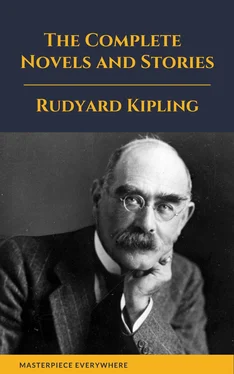‘Don’t, Lalji, don’t!’
‘Why not, Kate? Why, even I am married.’
‘Yes, Yes. But it is different. Kate would rather you didn’t, Lalji.’
‘Very well,’ answered the Maharaj, with a pout. ‘Now I am only a little child. When I am well I will be a king again, and no one can refuse my gifts. Listen. Those are my father’s trumpets. He is coming to see me.’
A bugle call sounded in the distance. There was a clattering of horses’ feet, and a little later the Maharajah’s carriage and escort thundered up to the door of the missionary’s house. Kate looked anxiously to see if the noise irritated her young charge; but his eyes brightened, his nostrils quivered, and he whispered, as his hand tightened on the hilt of the sword always by his side—
‘That is very good! My father has brought all his sowars.’
Before Kate could rise, Mr. Estes had ushered the Maharajah into the room, which was dwarfed by his bulk and by the bravery of his presence. He had been assisting at a review of his bodyguard, and came therefore in his full uniform as commander-in-chief of the army of the State, which was no mean affair. The Maharaj Kunwar ran his eyes delightedly up and down the august figure of his father, beginning with the polished gold-spurred jack-boots, and ascending to the snowy-white doeskin breeches, the tunic blazing with gold, and the diamonds of the Order of the Star of India, ending with the saffron turban and its nodding emerald aigrette. The King drew off his gauntlets and shook hands cordially with Kate. After an orgy it was noticeable that his Highness became more civilised.
‘And is the child well?’ he asked. ‘They told me that it was a little fever, and I, too, have had some fever.’
‘The Prince’s trouble was much worse than that, I am afraid, Maharajah Sahib,’ said Kate.
‘Ah, little one,’ said the King, bending over his son very tenderly, and speaking in the vernacular, ‘this is the fault of eating too much.’
‘Nay, father, I did not eat, and I am quite well.’
Kate stood at the head of the bed stroking the boy’s hair.
‘How many troops paraded this morning.’
‘Both squadrons, my General,’ answered the father, his eye lighting with pride. ‘Thou art all a Rajput, my son.’
‘And my escort—where were they?’
‘With Pertab Singh’s troop. They led the charge at the end of the fight.’
‘By the Sacred Horse,’ said the Maharaj Kunwar, ‘they shall lead in true fight one day. Shall they not, my father? Thou on the right flank, and I on the left.’
‘Even so. But to do these things, a prince must not be ill, and he must learn many things.’
‘I know,’ returned the Prince reflectively. ‘My father, I have lain here some nights, thinking. Am I a little child?’ He looked at Kate a minute, and whispered, ‘I would speak to my father. Let no one come in.’
Kate left the room quickly, with a backward smile at the boy, and the King seated himself by the bed.
‘No, I am not a little child,’ said the Prince.
‘In five years I shall be a man, and many men will obey me. But how shall I know the right or the wrong in giving an order?’
‘It is necessary to learn many things,’ repeated the Maharajah vaguely.
‘Yes, I have thought of that lying here in the dark,’ said the Prince. ‘And it is in my mind that these things are not all learned within the walls of the palace, or from women. My father, let me go away to learn how to be a prince!’
‘But whither wouldst thou go? Surely my kingdom is thy home, beloved.’
‘I know, I know,’ returned the boy. ‘And I will come back again, but do not let me be a laughing-stock to the other princes. At the wedding the Rawut of Bunnaul mocked me because my school-books were not as many as his.’ And he is only the son of an ennobled lord. He is without ancestry. But he has been up and down Rajputana as far as Delhi and Agra, ay, and Abu; and he is in the upper class of the Princes’ School at Ajmir. Father, all the sons of the kings go there. They do not play with the women; they ride with men. And the air and the water are good at Ajmir. And I should like to go!’
The face of the Maharajah grew troubled, for the boy was very dear to him.
‘But an evil might befall thee, Lalji. Think again.’
‘I have thought,’ responded the Prince. ‘What evil can come to me under the charge of the Englishmen there? The Rawut of Bunnaul told me that I should have my own rooms, my own servants, and my own stables, like the other princes—and that I should be much considered there.’
‘Yes,’ said the King soothingly. ‘We be children of the sun—thou and I, my Prince.’
‘Then it concerns me to be as learned and as strong and as valiant as the best of my race. Father, I am sick of running about the rooms of the women, of listening to my mother, and to the singing of the dance girls; and they are always pressing their kisses on me. Let me go to Ajmir. Let me go to the Princes’ School. And in a year, even in a year—so says the Rawut of Bunnaul—I shall be fit to lead my escort, as a King should lead them. Is it a promise, my father?’
‘When thou art well,’ answered the Maharajah, ‘we will. speak of it again—not as a father to a child, but as a man to a man.’
The Maharaj Kunwar’s eyes grew bright with pleasure. ‘That is good,’ he said—‘as a man to a man.’
The Maharajah fondled him in his arms for a few minutes, and told him the small news of the palace—such things as would interest a little boy. Then he said laughing, ‘Have I your leave to go?’
‘Oh! my father!’ The Prince buried his head in his father’s beard and threw his arms around him. The Maharajah disengaged himself gently, and as gently went out into the verandah. Before Kate returned he had disappeared in a cloud of dust and a flourish of trumpets. As he was going, a messenger came to the house bearing a grasswoven basket, piled high with shaddock, banana, and pomegranate—emerald, gold, and copper, which he laid at Kate’s feet, saying, ‘It is a present from the Queen.’
The little Prince within heard the voice, and cried joyfully, ‘Kate, my mother has sent you those. Are they big fruits? Oh, give me a pomegranate,’ he begged as she came back into his room. ‘I have tasted none since last winter.’
Kate set the basket on the table, and the Prince’s mood changed. He wanted pomeranate sherbet, and Kate must mix the sugar and the milk and the syrup and the plump red seeds. Kate left the room for an instant to get a glass, and it occurred to Moti, who had been foiled in an attempt to appropriate the Prince’s emeralds, and had hidden under the bed, to steal forth and seize upon a ripe banana. Knowing well that the Maharaj Kunwar could not move, Moti paid no attention to his voice, but settled himself deliberately on his haunches, chose his banana, stripped off the skin with his little black fingers, grinned at the Prince, and began to eat.
‘Very well, Moti,’ said the Maharaj Kunwar, in the vernacular; ‘Kate says you are not a god, but only a little grey monkey, and I think so too. When she comes back you will be beaten, Hanuman.’
Moti had half eaten the banana when Kate returned, but he did not try to escape. She cuffed the marauder lightly, and he fell over on his side.
‘Why,: Lalji, what’s the matter with Moti?’ she asked, regarding the monkey curiously.
‘He has been stealing, and now I suppose he is playing dead man. Hit him!’
Kate bent over the limp little body; but there was no need to chastise Mod. He was dead.
She turned pale, and, rising, took the basket of fruit quickly to her nostrils, and sniffed delicately at it. A faint, sweet, cloying odour rose from the brilliant pile. It was overpowering. She set the basket down, putting her hand to her head. The odour dizzied her.
Читать дальше












